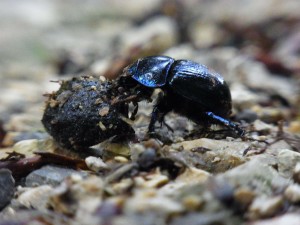European Dung Beetles To Help Farms All Year Round
May 18th, 2017A five-year, $23.7 million dung beetle project has been announced this week that will help control parasites.
Two new species of French dung beetle will be provided to over 1,000 livestock producers around south-eastern Australia. The scheme will use dung beetles as ‘ecosystem engineers’ in order to improve the health of soil and pastures and reduce the spread of diseases and nutrient run-off into waterways.
These beetles will be active in spring and it is hoped that they will decimate bush flies in areas of moderate temperature all year round. At least four more species of dung beetle will be introduced into the country over the next five years, in order to have beetles that can work during every season.
The beetles have been mass reared by Dung Beetle Solutions Australia and are expected to do well on cattle and sheep farms. Trials with small numbers of beetles have been completed and over the next five years, more beetles will be released and monitored at larger trial sites.
Barnaby Joyce, Minister for Agriculture said that the “humble dung beetle” could deliver big benefits to Australian farms. “We know it’s important that R&D isn’t just pie-in-the-sky ideas, but can be translated into real results and the Australian Bureau of Agricultural and Resource Economics and Sciences have found that for every dollar the government invests in agricultural R&D, farmers generate a $12 return within 10 years.”
Each year, 80 million tonnes of dung is produced by Australian livestock. Dung beetles have been shown to greatly reduce bush fly numbers during summer, by drying out and burying dung so there is nothing for the maggots to live on. This significantly reduces intestinal parasites and bacterial diseases like pink eye. In 1965-85, the CSIRO’s Dung Beetle Project introduced 23 foreign species of dung beetles to Australia, which reduced bush flies by approximately 90%. Dr Bernard Doube from Dung Beetle Solutions says that if the European beetles adapt well to their new environment, the parasite problem could be solved within a decade or so.
R&D activities associated with farming, such as those related to plantations, vineyards or orchards, may be eligible for the R&D Tax Incentive. This scheme encourages companies to conduct R&D activities that may not have been commenced otherwise. To find out whether your activities qualify, contact Swanson Reed R&D Tax Advisors for a free assessment.
Categories
- ATO Guidance and Materials
- AusIndustry Guidance and Materials
- Case Law
- Federal Budget 2021
- Federal Budget 2022
- For Accountants
- General Information
- Government Policy and Treasury
- Industry Specific Issues
- Interpretative Decisions
- Legislation and Parliamentary Matters
- R&D Tax Credit
- R&D Tax Funding Strategies
- R&D Tax Loans
- Recent News
- Tax Determinations
Archives
- April 2024
- March 2024
- February 2024
- January 2024
- December 2023
- November 2023
- October 2023
- September 2023
- August 2023
- July 2023
- June 2023
- May 2023
- April 2023
- March 2023
- February 2023
- January 2023
- December 2022
- November 2022
- October 2022
- September 2022
- August 2022
- July 2022
- June 2022
- May 2022
- April 2022
- March 2022
- February 2022
- January 2022
- December 2021
- November 2021
- October 2021
- September 2021
- August 2021
- July 2021
- June 2021
- May 2021
- April 2021
- March 2021
- February 2021
- January 2021
- December 2020
- November 2020
- October 2020
- September 2020
- August 2020
- July 2020
- June 2020
- May 2020
- April 2020
- March 2020
- February 2020
- January 2020
- December 2019
- November 2019
- October 2019
- September 2019
- August 2019
- July 2019
- June 2019
- May 2019
- April 2019
- March 2019
- February 2019
- January 2019
- December 2018
- November 2018
- September 2018
- July 2018
- June 2018
- May 2018
- April 2018
- March 2018
- February 2018
- January 2018
- December 2017
- November 2017
- September 2017
- August 2017
- July 2017
- June 2017
- May 2017
- April 2017
- March 2017
- February 2017
- January 2017
- December 2016
- November 2016
- October 2016
- September 2016
- August 2016
- July 2016
- June 2016
- May 2016
- April 2016
- March 2016
- February 2016
- January 2016
- December 2015
- November 2015
- October 2015
- September 2015
- August 2015
- July 2015
- June 2015
- May 2015
- April 2015
- March 2015
- February 2015
- January 2015
- November 2014
- October 2014
- September 2014
- August 2014
- July 2014
- June 2014
- May 2014
- April 2014
- March 2014
- February 2014
- January 2014
- December 2013
- November 2013
- October 2013
- September 2013
- May 2013
- April 2013
- March 2013
- September 2012
- August 2012
- June 2012


 Free Call: 1300 009 390
Free Call: 1300 009 390






 News & Research
News & Research



